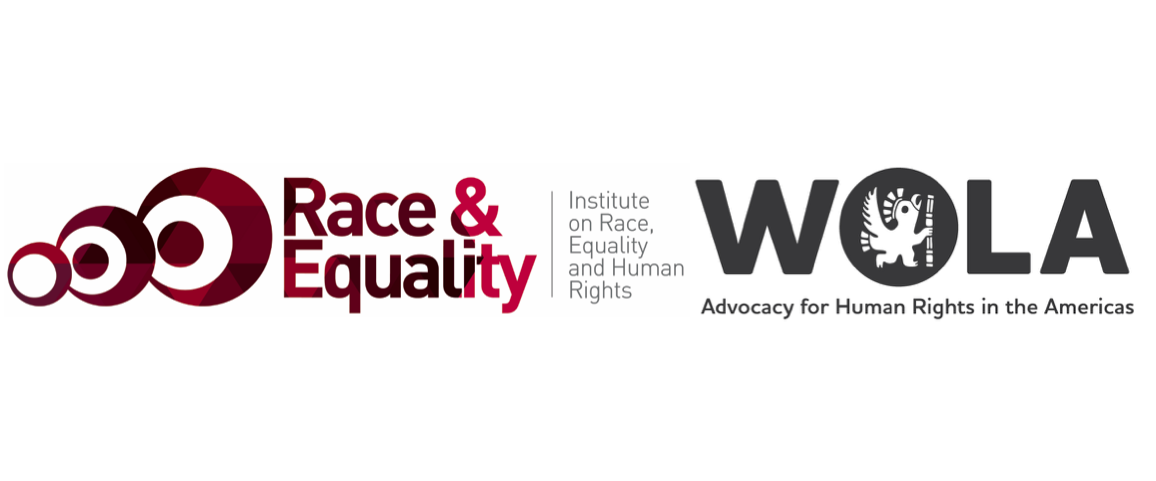The Institute on Race, Equality and Human Rights and the Washington Office on Latin America Denounce the Threats and Attacks Against the Leaders of the Colombian Organization AFRODES
The Institute on Race, Equality and Human Rights and the Washington Office on Latin America (WOLA) condemn the threats and attacks against the lives of several members (and their families) of […]


The Institute on Race, Equality and Human Rights and the Washington Office on Latin America (WOLA) condemn the threats and attacks against the lives of several members (and their families) of the National Association of Displaced Afro-Colombians (AFRODES), a nationwide umbrella organization that defends the rights of Afro-Colombians displaced as a result of the Colombian armed conflict. We urge the Colombian government to adopt the necessary protective measures to guarantee these leaders’ rights to life, physical safety and political participation. In Colombia, the signing of the Peace Accords is approaching, which through its “ethnic chapter” will obligate the State to adopt specific measures to guarantee the rights of the country’s ethnic groups. The governments of Colombia and the United States should support and help reinforce measures to protect Afro-Colombian leaders and organizations.
Since the organization’s creation in 1999, members of AFRODES have seen their rights systematically violated. The constant threats received by AFRODES members have seriously undermined their organizing work. Several of the organization’s leaders have been killed or victims of assassination attempts. Recently, leaders of organizations associated with AFRODES Cali and their family members have been victims of threats and attacks. In some cases, formal petitions for protection measures made to the Colombian government have been rejected based on risk-assessment evaluations that incomprehensibly establish that these leaders face only “ordinary risks.” Of all AFRODES members facing clear risks, only a very few have been granted protection measures.
The most recent threats and attacks against AFORDES Cali’s leaders and their families include the following occurrences:
- On September 10, 2016, the son of the leader Stela Alomia was wounded by gunshot and is currently in critical condition. This occurred when the victim went to check on the state of his home (located in the Barrio Taller sector of Potrero Grande), which the victim and his family were forced to abandon in December 2015 after numerous threats and an attack against a different son of Stela. The visit was made in order to avoid losing a housing subsidy for having “abandoned” the property.
- Erlendy Cuero, Vice-President of AFRODES, continues to receive telephoned threats to assassinate her and one of her children. These threats have continued to intensify since 2013, when she participated in a thematic hearing before the Inter-American Commission on Human Rights. Recently, Erlendy’s son was a victim of an assassination attempt on March 27, 2016. Before that, on September 1, 2015 two armed men attempted to kill her at her house. On February 7, 2015 a leaflet was left at her house that threatened her life and the life of her daughter if they did not leave the Llano Verde neighborhood.
- On July 30, 2016 the leader Yaneris Cabrera received calls and text messages threatening her life and making explicit reference to the organizing work she does with AFRODES. She is the secretary of AFRODES Cali, in charge of announcements, documentation and monitoring of the organization’s activities.
- The daughter of the leader Yenny Castro was a victim of forced recruitment in December of 2014. Additionally, Yenny was leading a group of persons in the substandard settlement Playa Alta, home to 55 displaced families. The settlement was burned down on April 29, 2015.
- In 2014 the door of the residence of the leader Felipe Asprilla was shot. In 2015, persons painted onto his door a message in blood that read “ASPRILLA IS GONE…” In addition, these persons left a leaflet that read “that the leaders promoting the election of the Llano Verde community action council will be military targets by the end of 2015.”
- Bernardo Cuero, leader and treasurer of AFRODES who resides in the Atlántico Department, has been the victim of multiple attacks on his life. Similarly to Erlendy, these threats and attacks have intensified since his participation in 2013 in a thematic hearing before the Inter-American Commission on Human Rights. His petitions for protective measures have been rejected by the Colombian government and the complaints made to the Prosecutor’s Office have not been adequately received and processed.
We recommend to the Colombian government the following:
- To guarantee the effective application of adequate protective measures in each of the cases heretofore described.
- To immediately investigate the incidents presented and to bring those responsible for them to justice.
- To begin a process of registering the organizations associated with AFRODES so that they may be eligible for collective reparations.
- To guarantee the integration—through consultation with the Ethnic Commission—of the principles contained in the Ethnic Chapter of the final Peace Accords in the mechanisms responsible for the implementation and monitoring of the accords.
We recommend to the United States government the following.
- The State Department and the Embassy in Bogota should ensure compliance with the human rights conditions linked with military assistance provided to Colombia by the United States that obligate the Colombian government to ensure protection for Afro-Descendent leaders.
- United States officials should insist that Colombia improve its protection mechanisms for members of the organization AFRODES and these leaders’ family members, investigate these instances and publicly condemn acts of violence against them.

